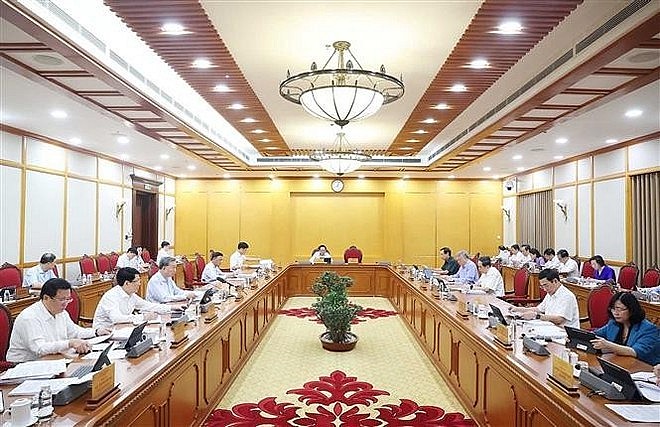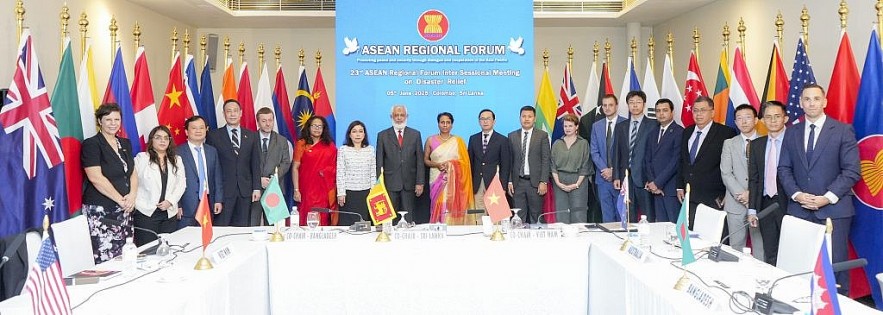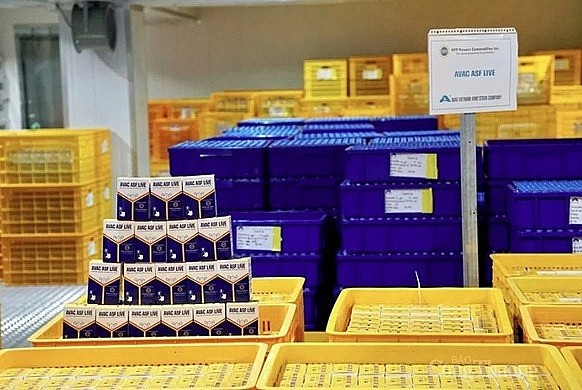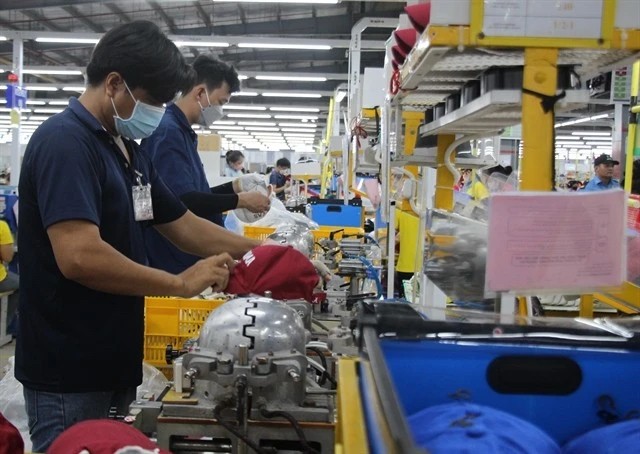Vietnam News Today (Jun. 7): Prime Minister works with Estonian firms to accelerate projects in Vietnam
| Vietnam News Today (Jun. 5): PM sets off for attendance at UNOC 3 in France, official visits to Estonia, Sweden | |
| Vietnam News Today (Jun. 6): Foreign Investment in Vietnam Surges in Five Months |
| Vietnam News Today (Jun. 7) notable headlines Prime Minister works with Estonian firms to accelerate projects in Vietnam Party chief urges proper personnel rearrangement amid administrative overhaul Japan remains Vietnam's priority: State President Vietnam co-chairs 23rd ARF inter-sessional meeting on disaster relief Vietnamese peacekeepers in Abyei actively respond to World Environment Day Vietnamese, Chinese carriers to launch first joint venture Vietnam to soon export first batch of ASF vaccine to Indonesia Hanoi listed among Asia’s top walkable cities by Agoda Vietnam among top 5 summer getaways for European travellers |
 |
| The meeting of the Politburo in Hanoi on June 6 (Photo: VNA) |
Party chief urges proper personnel rearrangement amid administrative overhaul
Party General Secretary To Lam has requested the careful rearrangement of personnel in line with the established principles and requirements, preventing internal complications while ensuring a smooth transition as well as appropriate policies and support for all of those affected.
He made the requirement while chairing the Politburo’s meeting in Hanoi on June 6 to look into the implementation of the Party Central Committee's and the Politburo's resolutions and conclusions regarding the reorganisation of the political apparatus and administrative units.
He gave comprehensive instructions on the reorganisation of provincial and commune-level administrative units, directing officials to prioritise efficiency, infrastructure readiness, and workforce streamlining.
The Party leader demanded a thorough review and seamless handover of tasks during the transition. The goal is clear: no responsibility should be overlooked, and the daily activities of citizens and businesses must continue uninterrupted.
The restructuring plan includes merging provincial- and communal-level units, and finalising staff arrangements at both provincial and communal levels. He directed provincial-level Party committees to set clear timelines for completion, with new administrative units expected to become operational from July 1, as in line with directives from the Politburo and the Party Central Committee’s Secretariat. Necessary infrastructure, equipment, and resources must be in place to support the transition, he added.
A key focus of the overhaul was workforce optimisation, with the Politburo calling for a streamlined contingent of officials, civil servants, and public employees, aligned with Party policies and State laws. The meeting also discussed adopting a two-tier administration model, ensuring benefits for resigning personnel, and encouraging those of the working age to continue serving.
The Government’s Party Committee was directed to issue decrees clarifying the functions, duties, and structures of specialised agencies under provincial and commune-level People’s Committees, ensuring consistency with the policies and conclusions issued by the Politburo and Secretariat.
Meanwhile, the National Assembly’s Party Committee was instructed to expedite the approval of constitutional amendments, laws, and resolutions to guide post-restructuring operations, including the organisation of NA deputies' delegations and People’s Councils at all levels, providing a clear path for localities and units to make changes effectively.
The Party committees of provinces and centrally-run cities were asked to perform tasks comprehensively, swiftly and efficiently.
The overarching goal, the General Secretary stressed, is to complete the consolidation of provincial and commune-level administrative units ahead of schedule, enabling Vietnam’s new administrative systems to function fully as soon as possible.
Prime Minister works with Estonian firms to accelerate projects in Vietnam
Prime Minister Pham Minh Chinh met with leaders of several major Estonian corporations in Tallinn on June 6 to boost investment and business cooperation in Vietnam.
At the meetings, PM Chinh introduced the current situation in Vietnam, saying that the country is implementing breakthrough strategies to shift its development model and usher in a new era. He noted that along with reforms to streamline administrative and local administration structures, Vietnam is carrying four key resolutions, collectively referred to as the “four pillars” for national advancement in the new era.
The PM emphasised that Vietnam is striving for GDP growth of 8% or more in 2025 and double-digit growth in the following years, pursuing rapid and sustainable development based on science, technology, innovation, and digital transformation. Vietnam is focusing on developing the private sector, improving the business and investment climate, and facilitating stable, long-term investment by foreign enterprises, he said.
Vietnam guarantees political stability, firmly safeguards its sovereignty, territorial integrity, and security, and continues to improve institutions, infrastructure, and human resources, ensuring a “transparent legal framework, seamless infrastructure, and intelligent workforce” to support businesses, he noted.
The Vietnamese Government, PM Chinh said, will provide all necessary support in accordance with the law to ensure effective and sustainable operations by foreign investors, including those from Estonia. He called for a results-oriented approach from businesses, stating that "commitments must lead to concrete outcomes,” thereby deepening the Vietnam–Estonia relationship in a practical and effective manner.
At the meeting with leaders of Bolt Group, including its President Jevgeni Kabanov, and Vice President Eirini Zaferiatou, they shared that Bolt is currently operating in 55 countries, with 4.5 million drivers serving over 200 million customers.
Bolt has started operations in Vietnam, offering car-hailing, scooter, and motorbike services, as well as food and grocery delivery. The group requested support from the PM to expedite the licensing process for Bolt's activities in the country.
PM Chinh commended Bolt’s business performance and welcomed its role in promoting digital transformation in transport and logistics. He praised the company's planned investments to enhance service quality, create jobs, and contribute to Vietnam's growing sharing economy.
Given the potential of Bolt’s services in a country of 100 million people with rising demand, the government leader noted that he had instructed relevant authorities to streamline administrative procedures and accelerate investment licensing processes as proposed by Bolt. He expressed his confidence in the company’s success in Vietnam and its ability to deliver practical benefits to the Vietnamese people.
The PM encouraged Bolt to adopt a gradual investment approach, starting in major cities and later expanding to other provinces, while enhancing service quality to ensure healthy competition. He also urged the company to explore new business areas, develop digital transformation models, integrate advanced technologies like AI, and share operational experience with Vietnamese agencies and businesses to foster sustainable cooperation and development.
Welcoming the Vietnamese PM to the 5.0 Robotics, the firm's CEO and co-founder Carlo Lustrissimi and Sales and Partnerships Development Specialist Ilaria Perla introduced the firm as a young Estonian tech company specialising in compact, affordable, and user-friendly industrial robots, suitable for businesses of all sizes.
The company, which has already deployed its solutions in the UK, Ireland, Australia and other markets, expressed interest in investing in Vietnam, mainly in smart manufacturing, industrial automation, and digital skills development. Notably, 5.0 Robotics aims to launch a project titled "100 robots for 100 talents”, which will see 100 advanced CNC machines provided for 100 Vietnamese SMEs, accompanied by training for 100 local robot technicians.
PM Chinh welcomed the company’s approach, highlighting the alignment between its products and the growing demand among SMEs, particularly in developing countries like Vietnam, for cost-effective, easy-to-integrate industrial automation.
He noted that Vietnam is prioritising science and technology, innovation, digital transformation, and robotics development.
The PM endorsed the company’s investment plan and called on 5.0 Robotics to transfer technology to Vietnam and contribute to building a vibrant innovation ecosystem, particularly in fields such as AI and smart factories. He encouraged the company to support Vietnamese startups in accessing new technologies and training high-quality human resources.
The government leader also urged 5.0 Robotics to partner with Vietnamese tech corporations to jointly develop markets, especially in Europe and ASEAN. Leveraging its strengths and potential, he said the company can "catch up and lead" in key areas and affirm its regional and global presence.
Earlier, PM Chinh visited Cybernetica - one of the symbols of Estonia's digital economy and a global pioneer in e-government solutions, cybersecurity and digital infrastructure - a major partner of the E-Estonia Centre that the Vietnamese leader visited in the morning of the same day.
Established in 1997 and a successor to the applied research unit of the Institute of Cybernetics under the Estonian Academy of Sciences, Cybernetica is recognised as one of the main architects of e-Estonia, developing the core parts of the e-Estonia ecosystem.
Currently, Estonia is the only country in the world that widely uses Internet voting for legally valid national elections, with a software system developed by Cybernetica.
X-Road is a secure and efficient data exchange platform that enables public agencies and the private sector to exchange information seamlessly and securely - the backbone of Estonian e-government, significantly reducing administrative time and costs.
Today, Cybernetica stands as one of the symbols of Estonia’s digital economy and a global pioneer in e-government solutions, cybersecurity, and digital infrastructure.
The company has implemented e-government solutions in 35 countries, including Japan, Malaysia, Kenya, Benin, and Ukraine. Notably, in Benin, more than 50 government agencies use Cybernetica’s solutions to provide nearly 270 digital public services to people.
At the working session, PM Chinh and the Vietnamese delegation held discussions with Cybernetica on the viability and potential for success in applying such solutions in a country of over 100 million people like Vietnam. The discussions covered topics such as institutional reforms, regulatory frameworks, and legal corridors required for successful implementation; the balance between digitalisation and citizen data protection; public-private partnerships; and investment in digital infrastructure such as cloud services, high-speed internet, and cybersecurity.
The Vietnamese leader noted that he had reached an agreement with the Estonian PM on the establishment of a joint task force between the two countries to continue discussions and support Vietnam in digital transformation, building a digital government, and developing a digital society and digital citizens. He also proposed Cybernetica share its experience and cooperate with Vietnam, contributing to the implementation of agreements between the two governments.
Japan remains Vietnam's priority: State President
State President Luong Cuong on June 6 hosted a reception for Japanese Ambassador to Vietnam Ito Naoki, during which he affirmed that Japan remains a key partner and a top priority in Vietnam's foreign policy.
President Cuong noted with delight that the Vietnam–Japan relationship has continued to grow substantively and effectively across all areas, grounded in long-standing historical connections and over five decades of diplomatic relations.
He highlighted that the upgrade to a comprehensive strategic partnership in late 2023 has further reinforced mutual political trust.
President Cuong underlined that Vietnam supports Japan in playing a more active role in contributing to peace, stability, cooperation and development in the region and globally.
He expressed a wish to work closely with Japan to implement the bilateral comprehensive strategic partnership in a substantive and effective manner, serving the interests of both peoples and contributing to peace, stability, cooperation and development in the region and the world at large. The Vietnamese State leader praised Ambassador Ito’s active efforts to advance bilateral ties and facilitate the successful visit to Vietnam in April by Japanese Prime Minister Ishiba Shigeru and his spouse. He described the visit as a major milestone that opened up new opportunities for cooperation in defence, security, human resources development, and green transition.
To build on the outcomes of the recent high-level visits, President Cuong urged Ito to help strengthen political trust through increased high-level exchanges and the effective implementation of bilateral cooperation mechanisms.
He stressed the need for deeper economic integration and cooperation on economic and food security, trade and investment, to support Vietnam’s goals of industrialisation, modernisation, and building an independent, self-reliant economy capable of withstanding global fluctuations.
President Cuong expressed his hope that both sides will focus on implementing new pillars of cooperation, such as science, technology, innovation, and digital transformation, established during PM Ishiba’s visit. He emphasised the importance of training high-quality human resources, particularly in semiconductors, as well as expanding cooperation in digital transformation and fully realising signed defence and security commitments.
He further stressed the need to enhance local-level ties, labour cooperation, cultural and people-to-people exchanges, and coordination at regional and international forums such as the United Nations, the Asia-Pacific Economic Cooperation(APEC), and the Association of Southeast Asian Nations (ASEAN).
On this occasion, President Cuong extended his best wishes to the Emperor and Empress of Japan and expressed his hope to welcome the royal family to Vietnam in the near future.
For his part, Ambassador Ito said he was honoured to attend the recent 50th anniversary of Vietnam’s national reunification on April 30 and looked forward to participating in celebrations marking Vietnam’s 80th National Day.
The ambassador conveyed high appreciation from PM Ishiba and his spouse for the success of their April visit, affirming Japan’s strong support for Vietnam’s development as the country enters a new era of development.
He proposed further concrete actions to strengthen bilateral ties, with a focus on digital transformation, green transition, and AI development.
The diplomat also confirmed Japan’s commitment to accepting 250 Vietnamese interns, and said both sides had agreed to cooperate on semiconductor research and push forward with the Vietnam–Japan University project. Defence and security, culture and sports, and people-to-people exchange will also be further promoted.
 |
| The 23rd ASEAN Regional Forum (ARF) Inter-Sessional Meeting on Disaster Relief was held in Colombo on 05 June 2025, hosted by Sri Lanka and co-chaired by Bangladesh, Sri Lanka and Vietnam, and attended by over 50 participants from 27 ARF member countries. |
Vietnam co-chairs 23rd ARF inter-sessional meeting on disaster relief
Vietnam, together with Sri Lanka and Bangladesh, co-chaired the 23rd ASEAN Regional Forum (ARF) Inter-Sessional Meeting on Disaster Relief, in Colombo, Sri Lanka, on June 4 and 5.
At the meeting, participants reviewed regional cooperation on disaster relief. Amid increasingly unpredictable weather patterns and the growing frequency and intensity of natural disasters such as storms and floods, delegates agreed on the need to further strengthen regional collaboration. Priority should be given to capacity building, preparedness, risk mitigation, and improving the effectiveness of civil-military coordination in humanitarian assistance.
They also agreed to utilise existing regional mechanisms and frameworks, particularly those under the Association of Southeast Asian Nations (ASEAN) and the ARF. Countries shared national experiences in disaster response and relief, from policy and legal frameworks to organisational structures, mobilisation of forces, equipment, and emergency deployment.
Representatives from Russia, Bangladesh, and Sri Lanka also shared their experiences after participating in relief efforts in Myanmar following the earthquake on March 28.
Within the ARF framework, delegates acknowledged progress made in implementing disaster relief cooperation under the ARF Hanoi Plan of Action II (2020–2025) and the ARF Disaster Relief Work Plan (2024–2027), reflecting the shared commitment of ARF member states in this priority area.
As co-chair of the meeting, the Vietnamese delegation actively contributed to coordinating the discussions and proposed several key orientations. These included strengthening coordination and cohesion among regional disaster relief mechanisms to ensure complementarity and mutual support, enhancing coordination in international relief efforts, and resuming ARF disaster response exercises. Vietnam also proposed a comprehensive assessment of the implementation of the ARF Hanoi Plan of Action II, including its disaster relief component, as a foundation for developing the next action plan.
On this occasion, representatives from the Vietnamese Ministries of National Defence; Public Security; and Agriculture and Environment presented practical experiences and best practices in emergency preparedness and disaster relief, while putting forward important recommendations to enhance regional cooperation. These contributions were welcomed and highly appreciated by participating delegates.
The ARF Inter-Sessional Meeting on Disaster Relief is one of the five ARF inter-sessional groups focusing on the forum’s key priority areas. Vietnam, Sri Lanka, and Bangladesh are currently co-chairing this group for the 2024–2027 period.
 |
| Indonesia becomes the third country, alongside Vietnam and the Philippines, to officially allow the use of the AVAC ASF LIVE vaccine (Photo: congthuong.vn) |
Vietnam to soon export first batch of ASF vaccine to Indonesia
Vietnam is set to export its first shipment of AVAC ASF LIVE African swine fever vaccine to Indonesia on June 9.
This marks a significant milestone, as the world's first live attenuated vaccine produced by AVAC Vietnam Joint Stock Company has been approved for circulation in the Indonesian market after nearly three years of registration and review.
The vaccine was granted official approval by Indonesia’s Ministry of Agriculture in April 2025, and the authorised importer and distributor in Indonesia is PT. Biotis Prima Agrisindo, headquartered in Gunung Sindur, West Java.
Indonesia becomes the third country, alongside Vietnam and the Philippines, to officially allow the use of the AVAC ASF LIVE vaccine.
The export of this first batch to Indonesia represents not only a major achievement for AVAC but also a significant step forward for Vietnam’s veterinary vaccine industry, demonstrating its ability to compete globally through scientific and technological innovation.
According to Dr. Nguyen Van Diep, general director of AVAC Vietnam Jsc, more than 3.5 million doses of AVAC ASF LIVE have been supplied to the market to date. Of the total, about 3 million doses have been used domestically in Vietnam, effectively helping to control ASF outbreaks. Nearly 500,000 doses have been exported to the Philippines and Nigeria, where they have received positive feedback.
Currently, the product is in the process of registration in several other countries, including India, Malaysia, Nepal, Myanmar, and other potential markets. To meet domestic and international demand, AVAC maintains a reserve stock of around 1.5 million doses, ready for emergency deployment.
The Ministry of Agriculture and Environment says Vietnam has made significant strides in the field of veterinary vaccine development. The country has successfully produced vaccines for several major animal diseases, including avian influenza (Navet-Vifluvac) in 2012, porcine reproductive and respiratory syndrome in 2015, foot-and-mouth disease in 2018, rabies in 2019, and most recently, African Swine Fever (NAVET-ASFVAC and AVAC ASF LIVE) in 2022.
 | Vietnam News Today (Jun. 3): PM Pham Minh Chinh to Attend UN Ocean Conference, Visit Estonia, Sweden Vietnam News Today (Jun. 3): PM Pham Minh Chinh to attend UN Ocean Conference, visit Estonia, Sweden; Vietnam, Germany look to boost strategic partnership; HCM ... |
 | Vietnam News Today (Jun. 4): Vietnam - Promising Candidate for Southeast Asia’s Next Powerhouse Vietnam News Today (Jun. 4): Vietnam seeks all-around ties with Hungary: Party official; Foreign arrivals to Da Nang hit 2.2 million in five months; Vietnam, ... |
Recommended
 National
National
Vietnam News Today (Jun. 7): Prime Minister works with Estonian firms to accelerate projects in Vietnam
 National
National
Vietnam News Today (Jun. 4): Vietnam - Promising Candidate for Southeast Asia’s Next Powerhouse
 National
National
Shangri-La Dialogue 22: Vietnam Highlights Some Issues of Ensuring Stability in a Competitive World
 National
National
Vietnam News Today (Jun. 3): PM Pham Minh Chinh to Attend UN Ocean Conference, Visit Estonia, Sweden
 National
National


